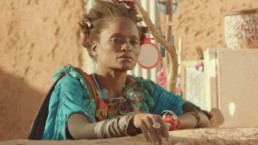Review: ‘Timbuktu’
An Academy-Award nominee for Best Foreign Language Film, Mauritania's official entry is powerful in its artistry and message.
Living in such modern times, one can sometimes feel the simultaneously-conflicting feelings of being at once incredibly connected to, as well as entirely disconnected from, our species as a whole. This global village reads headlines and news stories that clue us in, keep us updated on current affairs, tragic and otherwise. Timbuktu, an Academy-Award nominee for Best Foreign Language Film (the official Mauritania entry) from director Abderrahmane Sissako, successfully brings the exotic landscape and culture of Jihadist occupied Timbuktu to incredible first-world relevancy, showing terror-born unrest through the eyes of everyday, dignified, Islamic people.
Timbuktu, at only a brisk ninety-seven minutes long, moves with a measured stillness, like specs of sand tumbling silently along through the film’s vast desert landscapes, to achieve arresting viewing. In a small village, we see a small band of Jihadist rebels enter Timbuktu (shot in Mauritania, for safety purposes), and begin to impose their own self-rule amongst the people: cigarettes, football, even music are outlawed– not in shouting rage or wild caricature, but rather, with the sort of controlled, direct tone of truer fear and imposition.
Timbuktu is that rare film, an important film that, through thoughtful, insightful, and heartfelt film-making, humanizes a tragic story of this modern culture.
Outside of the small city and its imposed rule by the extremists, a local cattle herder Kidane (Ibrahim Ahmed aka Pino) lives peacefully in the sand dunes with his wife Satima (Toulou Kiki), his daughter Toya (Layla Walet Mohamed), and Issan (Mehdi Ag Mohamed), their twelve-year-old shepherd. Kidane’s pleasures consist of only seeing his family’s faces, especially that of his young daughter Toya, wide-eyed and beautiful. So when the loss of a calf at the hand of young Issan leads to a confrontation gone wrong with Kidane and an imposing fisherman, Kidane is removed from his family, leading to his fate being decided by the Islamic rebels who capture him in the city. A brilliantly woven storyline that organically merges to capture an entire landscape of oppressed life, we as the audience are treated with an experience of seeing first-hand the plight and oppression of these people, standing in direct contrast to the willful rebels that aim to rule them.
Of exceptional note is the confident directing on display. Life here in Timbuktu is shown as observed in the tradition and religious culture that dictates normal life, seen praying in mosques and praising Allah in respectful observance. The most successful aspect of the film, separate from the artistry, is with the dueling circumstances and practices of the Islamic people and the extremists who twist and bend religion to their will. In a scene, a rebel sits down with a local mother and daughter, and, with a translator (language barriers separate the rebels even further from the Islamic people and their philosophies) requests to marry her. When his offer is denied in a dignified manner, he assures in measured yet direct tone that the next time he asks, it will be in an aggressive way, to which she accepts with solemn grace. Sissako’s biggest achievement is giving back the humanity to a people and culture that, in headline news, can make us forget that we share collectively as a human race.
Timbuktu is that rare film, an important film that, through thoughtful, insightful, and heartfelt film-making, humanizes a tragic story of this modern culture. A beautifully made and haunting film (with gorgeous camerawork by Blue is the Warmest Color cinematographer Sofian El Fani) that is truly impactful, Timbuktu will stay in the minds of audiences to come.
Ryan Rojas
Ryan is the editorial manager of Cinemacy, which he co-runs with his older sister, Morgan. Ryan is a member of the Hollywood Critics Association. Ryan's favorite films include 2001: A Space Odyssey, The Social Network, and The Master.

